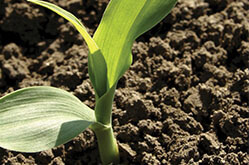Field Focus: Optimizing Spring Planting
Mar 29, 2024

As we welcome the arrival of spring, farmers across SE Nebraska gear up for the busy planting season ahead. With soil temperatures warming up and the first days of April here, it's time to dive into some essential tips and considerations to ensure a successful planting season.
Monitoring Soil Temperatures: One of the first steps in spring planting preparation is keeping a close eye on soil temperatures. Currently ranging between 45 to 50 degrees Fahrenheit across most of SE Nebraska, these warm soil conditions signal that corn planting will soon be underway. Stay informed about soil temperatures by utilizing resources like the UNL soil temps website, which provides real-time updates.
Mitigating Frost Risks: Reflecting on past experiences, such as the frost event in 2014, reminds us of the importance of risk management during early planting. With corn and soybeans susceptible to frost damage, especially in early emerging stands, it's crucial to monitor weather patterns and adhere to historical frost-free dates to minimize potential losses.
Evaluating Soil Moisture Levels: Despite warming temperatures, SE Nebraska remains below normal in soil moisture levels. Spotty winter and early spring moisture distribution raise concerns about subsoil moisture deficits for the upcoming summer months. Regularly monitoring soil moisture levels through resources like the U.S. Drought Monitor can help farmers stay informed and make informed decisions.
Optimizing Planting Conditions: Understanding the impact of various factors on crop emergence, such as residue, soil texture, planting date, and seed depth, is key to optimizing planting conditions. Adjusting planting practices based on these considerations can enhance emergence and growth rates, ultimately leading to better yields.
Input Management for Yield Optimization: Maintaining optimal planting populations for corn and avoiding cuts in nitrogen rates are essential for maximizing yield potential. While reducing populations or nitrogen rates may seem like cost-saving measures, they can significantly impact yield potential and profitability in the long run.
As you prepare for planting season, Frontier Cooperative is here to support you every step of the way. From expert advice to quality products, we're committed to helping you achieve success in the field. Stay tuned for more agronomic insights and updates throughout the planting season.